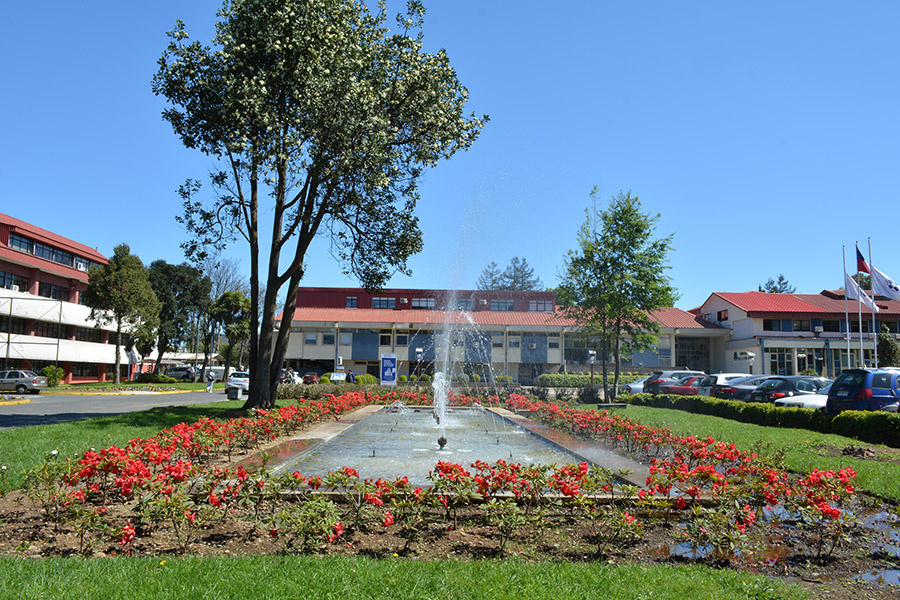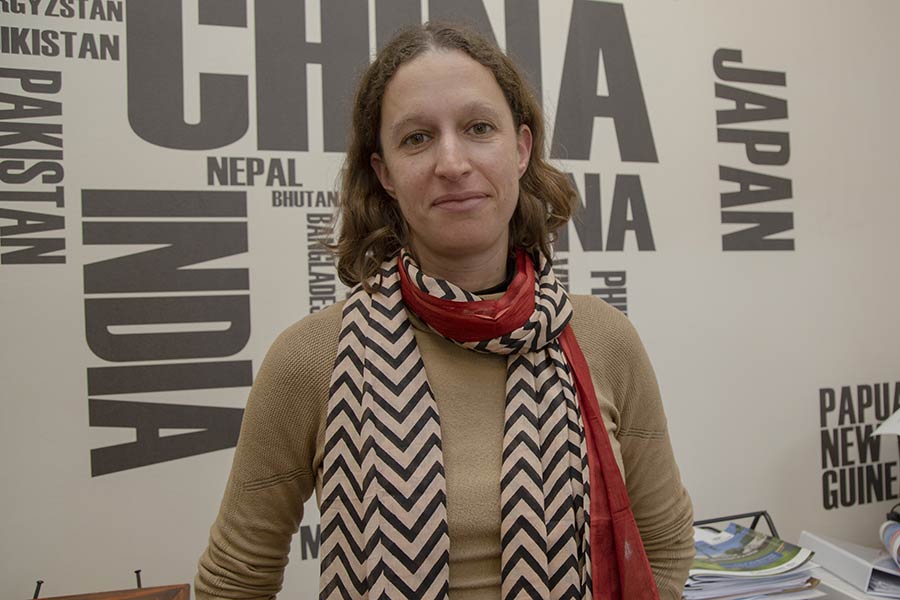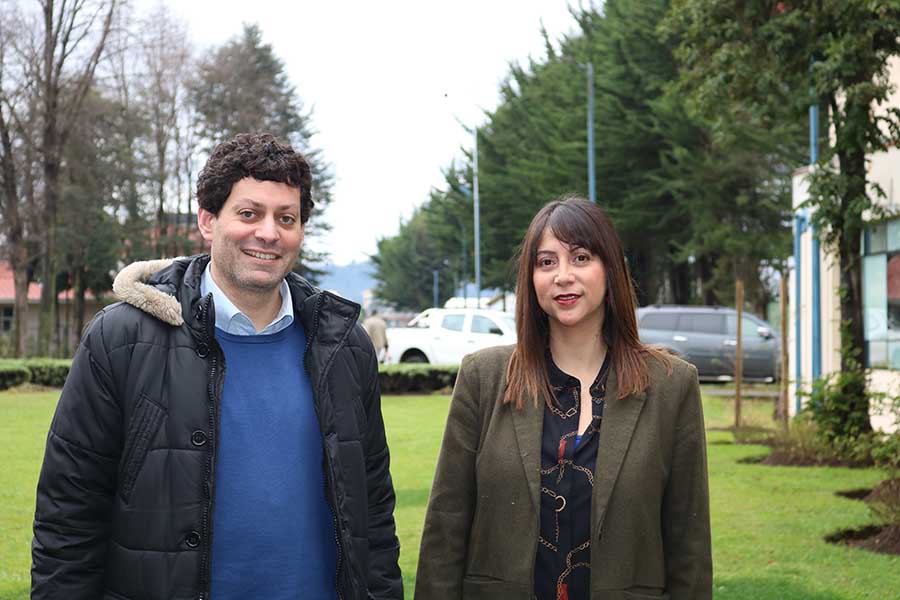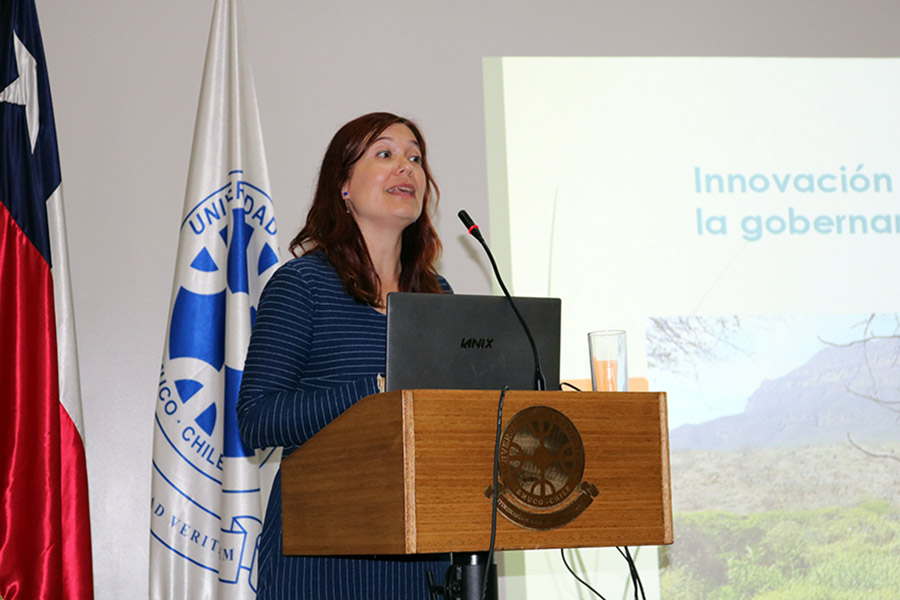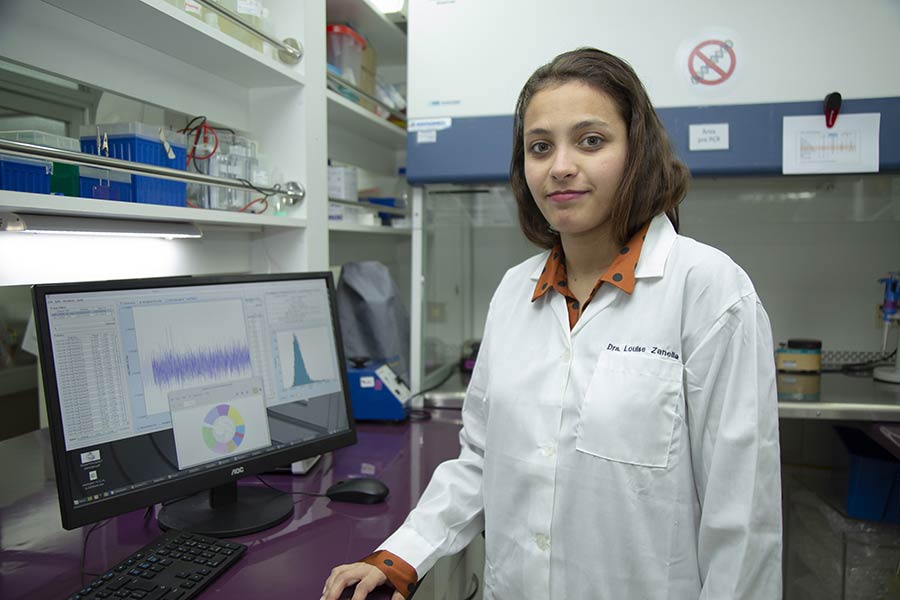|
What stands out among the approved projects in the contest of 2019 is the diversity of research fields: history; psychology; engineering; geography and urbanism; legal and political sciences; linguistics, literature and philology; medicine G2-G3; mathematics; biology; health and animal production. |
The Universidad de La Frontera (UFRO) positions itself as a leader in scientific productivity after getting 14 Fondecyt Initiation Projects approved in 2019. This makes it the regional state university with most projects approved in this competition, being in eighth place at the national level. For the university authorities it is a reason to feel proud and motivated to move forward. “This result reflects a research strategy that we have been implementing in recent years, the outcome of the efforts of many people, what allows us to keep increasing our productivity. This makes us visible in a very strong way and challenges us to keep working on new fields of knowledge, to strengthen our collaboration networks and to strengthen our internationalization processes,” Dr. Eduardo Hebel Weiss, the Rector of the UFRO, said. The UFRO presented 34 proposals in the last Fondecyt contest and got 14 of them approved, two more than in 2018. That is more than one billion Chilean pesos in resources for these projects. Dr. Renato Hunter Alarcón is the Vice-rector for Research and Graduate Studies at the UFRO and explained that the university is a great center for research and development in the Araucanía Region that helps to promote a different image of the region. “Today, we are presenting excellent indicators in science and technology and we are somehow changing the image of a region that is depressed or has a low educational and socioeconomic index. As a university, we are contributing and turning the region into a place of research, innovation and development,” Dr. Hunter explained. He added that, although the University's scientific and technological initiatives also focus on problems in other regions of the country, the knowledge that is created here remains in the region and is expected to be implemented in the future. He also said that it is important to consider the research fields that contribute to the issues being discussed at the moment, such as water resources, deforestation, climate change, and the industry 4.0. ENCOURAGING YOUNG RESEARCHERS The Director of Research of the University, Dr. César Arriagada Escamilla, appreciated the contribution of young researchers in the increase of the institutional indicators. In this context, he pointed out that the efforts to encourage the initiation of research have led to positive results. “Some of the researchers who got their projects approved in this competition have already participated in the institutional post-doctoral contest, what shows us that we are on the right track. The important thing is that they develop this potential during their entire career in science, because this is the first step, this is where they enter the world of first level research,” Dr. Arriagada explained. The university authorities congratulated the researchers who got their projects approved: Carolina Navarrete, María Francisca Román, Leonardo Sierra, Andrés Jaramillo, Mónica Pavez, Paula Meli, Jorge González, Mario Fabregat, Alejandra Calabi, Fernando Dias, Daniela Gómez, Rommy Díaz, Paola Comparin, and María Morales. The research fields of the different projects are: history; psychology; engineering; geography and urbanism; legal and political sciences; linguistics, literature and philology; medicine G2-G3; mathematics; biology; health and animal production. THE PROJECTS Project Code: 11190860 Project Code: 11190428 Project Code: 11190300 Project Code: 11190621 Project Code: 11190653 Project Code: 11190362 Project Code: 11190844 Project Code: 11190358 Project Code: 11191021 Project Code: 11190543 Project Code: 11190799 Project Code: 11191199 Project Code: 11190961 Project Code: 11190501
Written by: Karimme Riadi Millas |
|
Dr. Lorena Vieli del Rio, an agricultural engineer and an academic of the Faculty of Agricultural and Forestry Science, is the new director of the International Affairs Office at the Universidad de La Frontera. Her work will be inspired by the collaborative work of the university community, being facilitators of international relations in academic and student related areas. |
Within the scenario of visibility of the International Affairs Office of the Universidad de La Frontera (UFRO), Dr. Lorena Vieli accepted the challenge of becoming its new director. She has full trust in this consolidated unit and that the new projects that might come up will be handled well by the well-trained team, with the support of the university government and the work that the academics and researchers have been doing over the years, consolidating the process of institutional internationalization. Dr. Lorena Vieli del Rio is an agricultural engineer and an academic of the Faculty of Agricultural and Forestry Science. She studied at the University Pontificia Universidad Católica in Chile, and then finished her Ph.D. at UC Santa Barbara in the USA. There, she started to build important international links and to join different research networks. Her fields of study were ecosystem services, agroecology and crop pollination. In this context she added: “It is favorable to approach those who have led outstanding experiences in this field with good results for our institution. It is in my interest that the International Affairs Office is present in the creation of new synergies, through programs, projects, research and cooperation on a different scale as well.” For Dr. Vieli, this was a positive invitation: “I am a researcher and I understand the position of our researchers regarding the institutional work and the link with our peers from foreign universities. That makes it easier for us to act as facilitators regarding the interaction of the academics. Besides, we will not only be able to strengthen these links and partnerships, but also to nurture them over time.” For the new director of the International Affairs Office, the premise is clear and the work has to contribute to “being a facilitator of the international relations of our academics and students.” In this context, she recognizes that, thanks to the work of those who have been dealing with the issue of internationalization, substantial progress has been achieved. “The university has grown to such an extent that today, we have many defined processes, both for the allocation of resources and for the support we can offer. Competitive funds have been established for the participation at international events (academics, graduate students and professionals) and for internships abroad (researchers). These actions are very important in the fields of management and planning.” Regarding student mobility, the new director said that the UFRO has a lot to offer. It is attractive for foreign students, due to the geographic location and the context of cultural richness. Therefore, she explained: “One of the new challenges is to observe ourselves better and to highlight our culture and local ties in a way that strengthens our international links, but from our own identity, which is what differentiates us from other universities.”
Written by: UFRO Communications Office
|
|
The UFRO is leading this project that is financed by the International Development Research Centre in Canada and the TTI’s Opportunity Fund of the Think Tank Initiative. It is an interesting initiative for the analysis of the regional economic development and the cooperation networks between businesses, and four countries are part of it. |
The UFRO is leading this project that is financed by the International Development Research Centre in Canada and the TTI’s Opportunity Fund of the Think Tank Initiative. It is an interesting initiative for the analysis of the regional economic development and the cooperation networks between businesses, and four countries are part of it. Which influence does the productive structure of the territory have on regional development? Is the productive concentration or diversification of the territory relevant? What do other experiences in Latin America show us? Which are the cooperation relations between companies? These are some of the questions that the project of international cooperation, which the Universidad de La Frontera (UFRO) is leading together with three other institutions, is trying to answer through the comparative analysis of different sectors and regions in El Salvador, Paraguay, Uruguay and Chile. The study is financed by the International Development Research Centre (IDRC) in Canada and the TTI’s Opportunity Fund of the Think Tank Initiative. The idea is to establish a characterization and the mapping of the productive specializations and capabilities in the region and to disclose the elements and effects of business cooperation by analyzing a total of 1,336 companies in 26 different sectors in the 4 different countries that are part of the project. The academics who represent Chile and who are the reason the UFRO is leading this project are Dr. Paulina Sanhueza (Faculty of Law and Business) and Dr. Ignacio Rodríguez (Faculty of Education, Social Science and Humanities). They started to develop this initiative in 2016 together with three other institutions: The Center for Analysis and Dissemination of the Paraguayan Economy (CADEP), the Salvadoran Foundation for Economic and Social Development (FUSADES), and the IECON Development Corporation of the University of the Republic (Uruguay). COMPARATIVE ANALYSIS The project aims at results that broaden the empiric evidence on business cooperation networks in Latin American economies. With only few exceptions, the previous empirical studies on this issue focused on cluster cases in countries of North America and Europe. “This is why we have concentrated on an innovative methodology of analysis of social networks that use data obtained by primary sources (surveys), since most of these studies use secondary data in order to measure the impact of business cooperation. This way, our study contributes with an interesting and innovative methodology in this field,” Dr. Sanhueza explained. This project of international cooperation meets all academic expectations, in the sense that “it allows us to apply for competitive funds, to do research with international peers, create knowledge associated with the territory and to involve undergraduate students during the different phases of the project,” the academic added. CHILE In the case of Chile, the Araucania Region was the focus of this study that concentrated on the analysis of productive specializations and the level of business cooperation in the wood, cereal, food, tourism and financial intermediation sector. Dr. Ignacio Rodríguez of the Department of Social Sciences commented: “The analysis of the different networks reveals that the companies that innovate and export the most are those with the most links of cooperation with other companies within their cluster, especially in the touristic sector. Nevertheless, the size of a company or its years of existence do not allow any clear conclusions regarding their links of cooperation.” For the study, 383 companies and 85 organizations were surveyed. In this respect, Dr. Rodriguez indicated: “We were able to observe that the organizations are important when it comes to connecting with networks and creating links between the companies that are part of them.” From a comparative perspective, the countries that have been studied do not show regions with a high local entrepreneurial capacity that can be the main support of a cooperation network. In fact, according to the researchers, “the connectivity of the networks critically depends on the role of the supporting organizations.” This is why one of the components of great relevance within the project is the elaboration of productive development policy recommendations for each country, according to the analyzed cases. The detailed data of each country, sorted by region and the territorial productive specializations and business cooperation is available on the following website: desarrolloterritorial.ei.udelar.edu.uy/tti
Written by: UFRO Communications Office
|
|
The current agreement between KU Leuven and the UFRO is one of the few agreements with a history of active cooperation, at the academic as well as the graduate student level. |
Since 2009, the Universities KU Leuven in Belgium and Universidad de La Frontera (UFRO) in Chile maintain two agreements that stand for constant exchange of knowledge between both institutions, through their undergraduate and graduate programs. One of these agreements is related to cooperation in research and the other one is linked to the possibility of obtaining a double degree in the doctoral program offered by the Faculty of Agricultural and Forestry Science of the UFRO. On this occasion, two academics and researchers of the Department of Earth and Environmental Sciences of KU Leuven, Dr. Constanza Parra, an Environmental Social Scientist, and Dr. Anton Van Rompaey, a full professor at the Department of Geography and Tourism, and an expert in Cartography and Analysis of the Landscape and Spatial Modeling, visited the university in order to expand the partnership in other fields of knowledge, since the department of the belgium institution brings together approaches of the Faculty of Agricultural and Forestry Sciences itself, as well as of the fields of engineering and health. In a meeting with Rodolfo Pihan and Dr. Adison Altamirano, the experts shared a brief presentation of the work of the Department of Earth and Environmental Sciences of KU Leuven, and the way in which they carry out multiple studies and projects that are related to the work carried out by the faculty of the UFRO. In this context, Dr. Constanza Parra comments that “the objective of this visit is to strengthen the cooperation that already exists and which different academics and researchers have been stimulating and promoting over the last few years. Unlike other visitors, we belong to the Faculty of Sciences. Before, the cooperation has taken place with the Faculty of Bioscience Engineering, and now, our visit that has been possible thanks to the contact with Dr. Altamirano seeks to strengthen and expand our cooperation and to create new content.” “The idea is to add new professors of the UFRO, who want to contribute to this inter-institutional cooperation, ideally students and academics of other units, who want to visit us in Belgium, either through exchanges or internships, as well as students from other disciplines of KU Leuven who want to come to Chile and to carry out interdisciplinary research, in which different issues of sustainability and environment come together by virtue of an interesting research that provides knowledge that can be applied in the Araucania Region in Chile," Dr. Parra pointed out. Dr. Adison Altamirano emphasized that “the visit strengthens the academic exchange that already exists between these two institutions for about ten years. Including this visit, more than 10 academics of KU Leuven have already come to the UFRO Faculty and a similar number of Chilean academics have visited the university in Belgium. This fact is very satisfying, since this is an agreement that constantly organizes different activities. On the other hand, this is the first seminar we have organized together with both institutions, which is a very important step for our partnership.” At the same time, Dr. Altamirano emphasized the connection that exists between the subjects of both institutions. He pointed out: “The research topics we mostly worked on address socio-ecological aspects, which are almost crossing to the fields of ecology and social sciences. In fact, they met with research groups and students of the Doctoral Program in Agri-Food Sciences and Environment, of which some students obtained a double degree and did internships. This is an extremely relevant topic because the visiting professors expressed their total confidence and willingness to host our students and researchers in the same way as it has happened before with our colleagues and graduate students.” SEMINAR Another purpose of the visit was the seminar “Challenges in Socio-Ecological Systems and their Relation with the Dynamics of the Landscape”, in which the researchers of KU Leuven, together with Dr. Paula Meli, a post-doctoral researcher of the Faculty of Agricultural and Forestry Sciences of the UFRO, and Dr. Adison Altamirano presented their work. The seminar brought a large number of professionals and experts together who were able to learn about quantitative issues, such as the estimation of forest degradation through remote sensing, or even more qualitative aspects related to environmental sustainability. At the same time, the speakers from KU Leuven and the UFRO showed their advances in research, which turned out complementary in realities at the European, Latin American and local levels, as in the case of the Araucania Region in Chile. This diversity of topics allowed the participation of academics in the field of social sciences, who will be able to expand their cooperation with the university in Belgium in the near future. “This is a great opportunity for students of the different doctoral programs of the UFRO, who can opt for a double degree, for example in Agri-Food Sciences and Environment, Applied Cellular and Molecular Biology, Natural Resource Sciences, and in Engineering with specialization in Bioprocesses. This is due to the fact that the double degrees are linked with the group of Science, Technology and Engineering”, Dr. Adison Altamirano explained.
Written by: Communications Office
|
|
The results of this unprecedented scientific work carried out by Dr. Luoise Zanella have been published in the influential scientific journal Scientific Reports of the recognized publishing house Nature Research. |
It is one of the most common viruses in the human being. The Epstein-Barr Virus (EBV) – a type of herpes virus – is transmitted in 90% of the cases during childhood, without symptoms. But if the infection occurs during adolescence or adulthood, it can cause different pathologies. Amongst the most dangerous are the lymphoma and gastric cancer. Despite of the huge scientific efforts to genetically classify this virus in order to associate it to clinical or epidemiological aspects of the diseases it causes, the results have not been consistent at all, because of its high genetic complexity, leading to mutations and recombination of its genome with the genome of the human cells. But it was Dr. Louise Zanella, a researcher of the Universidad de La Frontera (UFRO), who combined this scenery and achieved to design a new classification scheme of the EBV. “I realized that there was a real problem in the literature about the Epstein-Barr; there was no consensus regarding the classification of the virus, because of the noise generated by its recombination, what did not allow a comparison of the classifications and affected the understanding of its viral evolution,” she explained. In order to solve this problem, she started to establish a different kind of classification than the traditional one, with new variations, identifying those mutations and recombinations that had hindered the process; an effort, no one had made until now. She started to explore the genomes of EBV and analyzed them systematically, with the help of the database that already exists and bioinformatics tools. “We are working with 188 genomes. We choose the preserved parts, identify and remove the recombination and analyze the different classifications,” the researcher explained. This is how they achieved to propose a new scheme of classification of the virus, with major evolutive coherence and potential application in the medical clinic. The results of this unprecedented experience, published in one of the most influential scientific journals, Scientific Reports, of the recognized publishing house Nature Research, also allowed to identify 12 EBV populations, of which three are associated with malignant tumors, what affects the possibilities of an assertive prognosis in patients who are infected by the virus. This is undoubtedly a very important contribution, especially in a country like Chile, where gastric cancer is one of the main causes of death, with a prevalence that puts Chile in first place in Latin America. Dr. Zanella is from Brazil and came to the Universidad de La Frontera two years ago in order to develop a postdoctoral project that is financed by the Performance Agreement. She admitted that genetics and viruses are her passion since she was young. At the Laboratory of Integrative Biology, which is part of BIOREN-UFRO and directed by Dr. Priscilla Brebi, she found a place where to create knowledge in this field. Currently, the researcher is working on two new papers, one about the speed of evolution of EBV and its geographical origin; and the other one about the evolutionary rate of the different identified populations and the age of the virus.
Written by: Karimme Riadi |





